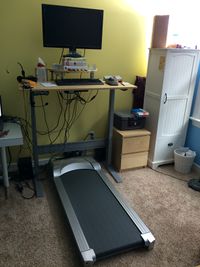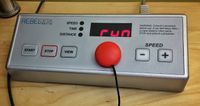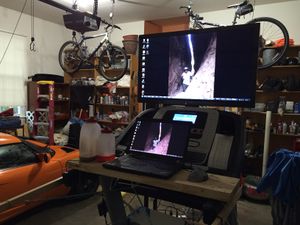Treadmill Desk
A Treadmill Desk has the potential of allowing you to exercise while working. I believe it's a viable option, but there are some important caveats.
- You can cover a lot of extra miles while working, so it's easy to overdo it. Walking at 2 mph for 8 hours would give you 16 miles a day, or 80 miles in a five-day work week. This is a lot of miles; more than enough to produce an injury. This means it's important to build up your mileage gradually, and monitoring your body for signs of impending disaster. If you're used to running high mileages, you may be more at risk than most. Running and walking use different muscles, and a highly trained runner is a specialist that is vulnerable to unaccustomed stresses. I would recommend starting off with walking for 15 minutes per hour for up to 4 hours per day, giving one hour of walking. Build it up from there cautiously.
- The stress of walking is far more dependent on pace than running. This is because the energy required to run a given distance is nearly constant, so running twice as fast requires twice the intensity, a simple linear relationship. Walking on the other hand requires a disproportionate amount of energy as the speed increases. People will naturally start running as the pace increases because of this. As a result, a seemingly small increase in pace incurs a surprisingly large increase in intensity. Biomechanically it's also a lot harder to walk faster, and the impact stress rises dramatically. This means you need to be cautious with your pace; I'd recommend starting at 0.8 to 1.2 mph. Build up the distance first, then the pace, and avoid increasing both together. See Calories burned running and walking for more details.
- Slow walking is not a substitute for aerobic exercise, so this should be an additional form of exercise. Personally, I find that the movement involved in using a treadmill desk helps keep my body loose and relaxed. Of course, that's only if we don't overdo it!
- Even though I'd previously been standing to work, I found that adapting to a treadmill desk has been hard on my feet than I'd expected. I'm nearly always barefoot when I'm working, and the treadmill is a much harder surface than a carpet.
- Phone calls are pretty easy while walking on a treadmill, though the noise can be an issue. My running treadmill is quite noisy, though this is not too bad with a good headset. The noise is both from the motor and from the sound of my feet landing. A good treadmill (see below) will have a quieter motor, but the noise of your feet landing can still be annoying for others.
- Looking at a PC screen is trickier than a phone call, as your head will bob up and down and sway from side to side as you walk. This can make it hard to read the screen, but it can also cause some motion sickness. I've found that a larger screen further away helps enormously with the motion sickness. I've been using a 40-inch screen at about 3 feet distance, and this solved most of my motion sickness issues.
- Typing and using a mouse are the hardest part of a treadmill desk, and it's highly dependent on pace. I've found 0.8 MPH is fairly easy, but it gets progressively harder as the pace increases. I found a mouse to be impractical for most tasks, but a trackball works fine. I love the Kensington Expert Trackball. Typing is more of an issue, and a large keyboard with well-spaced keys helps if you're a touch typist. I've no idea how well you'd do if you don't touch type, as looking at the keyboard to type is likely to cause motion sickness and neck strain. Keeping the pace slow helps with the ease of typing. Of course, using dictation software is another option that can work really well (I use Dragon Speaking Naturally.)
1 Which Treadmill?
Which treadmill to choose is tricky, but here's my overview of the market. I've only looked at treadmills that go under a separate standing desk. This is mostly because I already have the electrically adjustable Geek Desk, but I'd strongly urge you to look for separate components. A good standing desk is a great long-term investment, and needs to be built extremely solidly. I've heard complaints from people that some of the other standing desks are not as rock solid as you need.
- Using a running treadmill with a plank of wood over the arms is an option that can allow you to try out a treadmill desk without too much investment (assuming you have a running treadmill of course). However, there's a real risk of injury if the plank falls, dumping the wood and laptop (plus wires) into your path. A running treadmill is likely to be louder than a treadmill designed for use as a desk, and there may be concerns that protracted use at the slow speed is likely to burn out the motor.
- I purchased the Rebel Desk 1000 which is a treadmill designed specifically for use with a desk. The Rebel Desk is one of the cheapest options on the market, and has had generally good reviews. . See below for a detailed review.
- A great looking option is the iMovR ThermoTread GT. However, I was put off by the lack of credible reviews and the price. (Note that http://www.workwhilewalking.com/is owned by iMovR, so its reviews are not credible and I consider it rather deceptive of them to stand up a pseudo-review site like this.)
- LifeSpan does a range of Under Desk Treadmills, but they appear to be lightly modified running treadmills. While people seem to get on okay with them, there is a regular complaint that the user interface requires you to press a lot buttons to use them. Also, unless you buy the highest end model, they have restrictions on how long they can be used per day. (Note that the DT3 moniker is for the under desk treadmills, and they do versions that are combined with a desk.)
| Treadmill | Price | Usage | Max Weight (Lbs) | Speed (MPH) |
|---|---|---|---|---|
| Rebel Desk 1000 | Error: Could not parse data from Amazon! | Unlimited | 250 | 0.5-2.0 |
| Lifespan TR800-DT3 | Error: Could not parse data from Amazon! | 3 hours/day | 300 | 0.4 - 4.0 |
| Lifespan TR1200-DT3 | Error: Could not parse data from Amazon! | 6 hours/day | 350 | 0.4 - 4.0 |
| Lifespan TR5000-DT3 | $1,500 | 10 hours/day | 400 | 0.4 - 4.0 |
| iMovR ThermoTread GT | Error: Could not parse data from Amazon! | Unlimited | 400 | Up to 2.5 |
2 The Rebel Desk 1000
The Rebel Desk is one of the cheapest treadmills that is designed to go under a standing desk. While it's far from perfect, overall I'm pleased with it. Let me start off with the positives:
- The biggest attraction of the Rebel Desk is its price, coming in far cheaper than most of the alternatives. Other than the weight limit (see below) the treadmill itself seems well-built, and comparable to other treadmills I've used.
- The Rebel Desk has a no limitations on how many hours per day it can be used. This is important to me, as I intend to build up to using it for most of the (extended) working day.
- The footprint of the Rebel Desk is relatively small. I find it is larger than I need in terms of walking surface, and I like the way it uses up less of my limited floorspace.
- The walking surface is fairly close to the ground, something that's important to me as I have a ceiling fan and I want to maintain a good clearance between my head and the blades! It also works nicely with my standing desk, and a high walking surface would've meant my desk might run out of height adjustment. The low height also makes it easy to step off and step onto the treadmill while it's running, something I'm sure would horrify the manufacturer's lawyers, but it works quite well.
 The side of the treadmill, with my usual size comparison of a Gu Packet. (I'm not sure my Metrologist friends would approve of this unit of measure.)
The side of the treadmill, with my usual size comparison of a Gu Packet. (I'm not sure my Metrologist friends would approve of this unit of measure.) - The power consumption seems reasonable to me. On standby it uses 1.8 watts, so I don't feel the need to unplug it when I'm not using it. The power consumption in use will vary somewhat with the weight of the user, but for me it draws 50 watts @ 0.5 MPH, rising to 155 watts at 2.0 MPH (unloaded power consumption is roughly half of that.)
- I consider the noise levels of the rebel desk to be reasonably low, but it's hard to convey in writing what this means. It's easy to provide some metrics using a sound level meter, but that may not convey what you need to know. There are several components to the noise of using a treadmill. Firstly, there is the noise the treadmill makes on its own, which ranges from 42 dB @ 0.5 MPH to 50 dB @ 2.0 MPH. This is pretty quiet, and is the sound of an electric motor going round, a vaguely similar sound to an electric fan. Once you step onto the treadmill the sound changes quite a bit. There is the sound of the belt, that is now rubbing on the supporting plate due to your weight, and that raises the sound level, from 60 dB @ 0.5 MPH to 65 dB @ 2.0 MPH. The other audible component is the sound of your feet landing on the treadmill, and while this only adds a handful of dB to the noise level, the intermittent nature of the sound makes it far more intrusive and tends to travel much further. I have my treadmill upstairs, and the sound of my footfalls is clearly audible downstairs, which can be more than a little annoying to others in the house. As an observant reader, you'll have noticed that this bullet point is under the positives section of my review. That's because I think the Rebel camp desk is about as quiet as a treadmill is likely to be without becoming prohibitively bulky and expensive. Whether or not the sound levels are acceptable for you will depend on your circumstances. I find that it's quiet enough that there is no intrusion on my phone calls, though I am using a good quality noise canceling headset.
- It's a minor point, but the Rebel Desk is a light silvery gray color. I appreciate this as it keeps my room a little lighter and makes the treadmill seem a little less unfriendly and imposing.
The Rebel Desk 1000 is not without its weaknesses:
- My biggest annoyance with the Rebel camp desk is that it does not keep track of my daily distance. While the treadmill is running it will show you the elapsed time and distance, and it will remember those numbers while it's paused. If you restart within 20 minutes, it will continue where it left off accumulating time and distance, as well as remembering the last pace selected. Unfortunately, after 20 minutes it resets and forgets the time and distance, and its initial speed is back to 0.5 MPH. It seems like such a simple thing to have implemented a manual reset to clear the accumulated distance! This problem is compounded by the inability of fitness trackers to record your movement. I've even tried attaching the Carmen I'm currently testing to my ankle, but it still doesn't register my steps. Some of the other treadmills will automatically track step count, which would be nice.
- The weight limit is just 250 pounds, which is far less than other treadmills. This is obviously a concern if you weigh more than that, but it may also reflect a weaker construction than the other treadmills. I've found no sense of flex or weakness in the Rebel Desk 1000, though I only weight 140 pounds. There is however an upside to the weight limit; the Rebel Desk is lighter than many alternatives, so it's easier to move around.
- The maximum speed is only 2.0 MPH, which is lower than I'd like. When I'm just listening to the phone, and don't need to type, it would be nice to boost speed up a little higher. The vast majority of the time this limit is not an issue as I'm actively using a computer and find a lower speed works better.
- The controller is functional, but uninspiring. There's nothing wrong with it, but in these days of full color touchscreens and mobile phone connected devices it seems a little antiquated. Of course, given the price point of this treadmill you have to except some compromises.
3 Improvised Treadmill Desk
I've used my running Treadmill, the ProForm Pro 2000 with a plank of wood over the arms. Over the years this treadmill has withstood fairly outrageous abuse, and while it's showing signs of wear, it's going strong. It's far from ideal as a treadmill desk, as it's bulky and noisy. I never and any problems with the plank of wood falling off, but I used a hefty piece of wood and put some high friction material to limit the chance of slippage. I found that in spite of being a compromised and cobbled together solution, this approach allowed me to verify that I could work at a treadmill desk.


